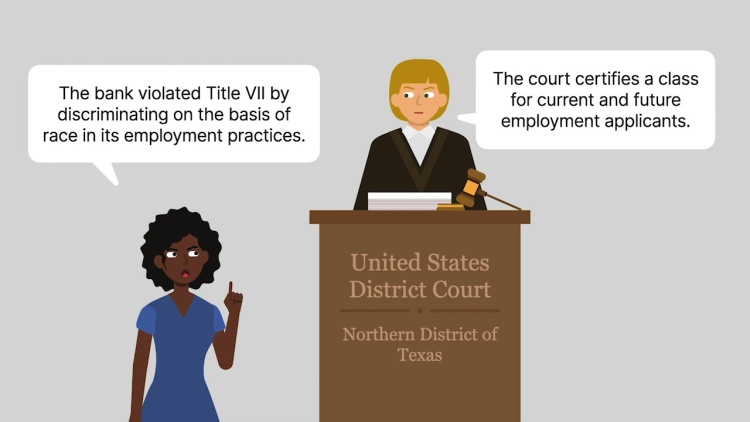Watson v. Fort Worth Bank & Trust
United States Supreme Court
487 U.S. 977 (1988)
- Written by Nan Futrell, JD
Facts
Clara Watson (plaintiff), a black employee, was hired by Forth Worth Bank & Trust (the Bank) (defendant) as a proof operator in 1973. In 1976, Watson was promoted to a drive-in teller position. In February 1980, Watson applied for a promotion to become a supervisor of the Bank’s main lobby tellers. A white male employee received that promotion. Watson then applied for a promotion to supervisor of the drive-in tellers. A white female employee received that promotion. In February 1981, after Watson had served as a main lobby teller and unofficial assistant to the male supervisor of the lobby tellers, the male supervisor was promoted, and Watson applied to fill the vacancy. A white female employee then serving as supervisor of the drive-in tellers was selected over Watson. Watson applied for the vacant position of supervisor of the drive-in tellers; a white male employee was selected. The Bank did not use any sort of formal criteria when evaluating and promoting applicants. Promotion selections were made based on the subjective judgment of supervisors who knew the candidates. Each of the supervisors involved in the promotions that Watson was denied was white. Watson sued the Bank, alleging its informal, discretionary method of awarding promotions created a disparate impact on the basis of race in violation of Title VII of the Civil Rights Act of 1964 (Title VII), 42 U.S.C. § 2000e et seq. The Bank prevailed in the lower court, and Watson petitioned for review by the United States Supreme Court.
Rule of Law
Issue
Holding and Reasoning (O’Connor, J.)
What to do next…
Here's why 907,000 law students have relied on our case briefs:
- Written by law professors and practitioners, not other law students. 47,100 briefs, keyed to 996 casebooks. Top-notch customer support.
- The right amount of information, includes the facts, issues, rule of law, holding and reasoning, and any concurrences and dissents.
- Access in your classes, works on your mobile and tablet. Massive library of related video lessons and high quality multiple-choice questions.
- Easy to use, uniform format for every case brief. Written in plain English, not in legalese. Our briefs summarize and simplify; they don’t just repeat the court’s language.





